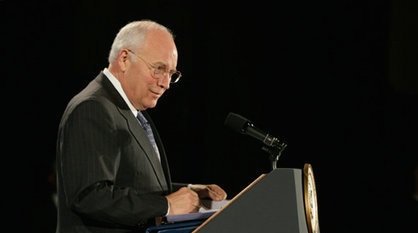When it comes to former Vice President Dick Cheney’s feeling about President Barack Obama’s foreign policy – particularly regarding terrorist activities in the Middle East and Obama’s military pull back in the region – Cheney isn’t pulling any punches.
Cheney has been making the rounds on the news airwaves and in private speeches. He recently spoke in Billings, Montana, where he addressed attendees at the Energy Expo trade show at MetraPark.
Before he launched his criticisms of president’s foreign policy, Cheney, the former CEO of Halliburton, praised the audience for their work in the energy industry and their contributions to the US economy.


